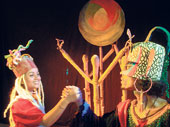 |
| Anukul Chandra Banerjee as Nana Saheb in Jhansir Rani |
Anukul Chandra Banerjee (1909- 1980) had several identities. For over 36 years he was at the helm of AH Wheeler and Co, the country-wide railway bookstore chain and publishing company inherited from his father, TK Banerjee. A philanthropist and founder of the Bengali Social and Cultural Association, Banerjee was a writer, translator and an amateur magician. But the identity he cherished most was that of theatre worker.
It is fitting that his friends and relatives should choose to celebrate his centenary with an eight-day theatre festival at Madhusudan Mancha between April 23 and 30, at 6.30pm.
Allahabad-based theatre group Roopkatha and the Bengali Association are collaborating with the Calcutta theatre group Sayak and the Eastern Zonal Cultural Centre to organise this festival. Plays directed by Bivas Chakraborty, Manoj Mitra, Rudraprasad Sengupta, Arun Mukhopadhyay, Meghnad Bhattacharya, Ashok Mukhopadhyay and Ramaprasad Banik will be staged over these eight days.
Chetana’s Putul Naacher Itikatha, Anya Theatre’s Nakchhabita and Nandikar’s Ajnyatobaas were presented in the first three days. Sundaram’s Galpo Hekim Saheb will be staged on Sunday. On April 27, 28 and 29, Theatre Passion’s Eti Mritajan, Theatre Workshop’s Jadio Galpo, Roopkatha’s Jo Bhigey Barish Mein and Sayak’s Dournaama will be performed.
Most of these groups have performed in Allahabad as part of the year-long centenary celebrations that began in 2008.
Though he never had his own group Banerjee produced and directed over 200 plays in Bengali, Hindi and English between 1937 and 1977. He considered Sisir Bhaduri his guru and longed for recognition from the Bengali commercial stage for his varied historical, social and musical productions.
His contribution to the Allahabad theatre movement was significant. At a time when Bengali theatre in Allahabad was confined to performances during the Durga puja, Banerjee tried to bring in a feel of the professional stage. Instead of allowing plays to drag through the night with drop curtains after every scene and a live orchestra to fill in the gaps, he presented neat performances that began and ended on time with no unwarranted breaks. In his plays, female roles were played by women, not male substitutes.
Apart from rendering hits from the Calcutta stage, Banerjee churned out a wide range of scripts. His translations of Othello, Macbeth, The Merchant of Venice, The Hound of Baskervilles and The Barretts of Wimpole Street were staged in Allahabad. He also staged a number of home-grown titles: Ballavpurer Rupkatha, Angar, Chitrangada, Jhansir Rani, Alamgir, Muktadhara, Kabuliwala and Ojeyo Vietnam. He financed most of his plays; few were willing to invest in something as “frivolous” as theatre.
Banerjee is also credited with having started Sruti Natak (audio play) in Allahabad and at least two of his proteges have made their mark on Bengali stage and in cinema: Swatilekha Sengupta and Meenakshi Goswami.
At the inauguration on Monday, Meenakshi recalled how Banerjee had reassured her even when her sword had accidentally damaged a chandelier while rehearsing for Jhansir Rani. Even a few days before he died, Banerjee was busy adapting The Sound of Music to a Bengali musical and planning a production of DL Roy’s Sahjahan.
One hopes the battle-worn theatre enthusiasts of Allahabad and Calcutta take heart from Banerjee’s story.











